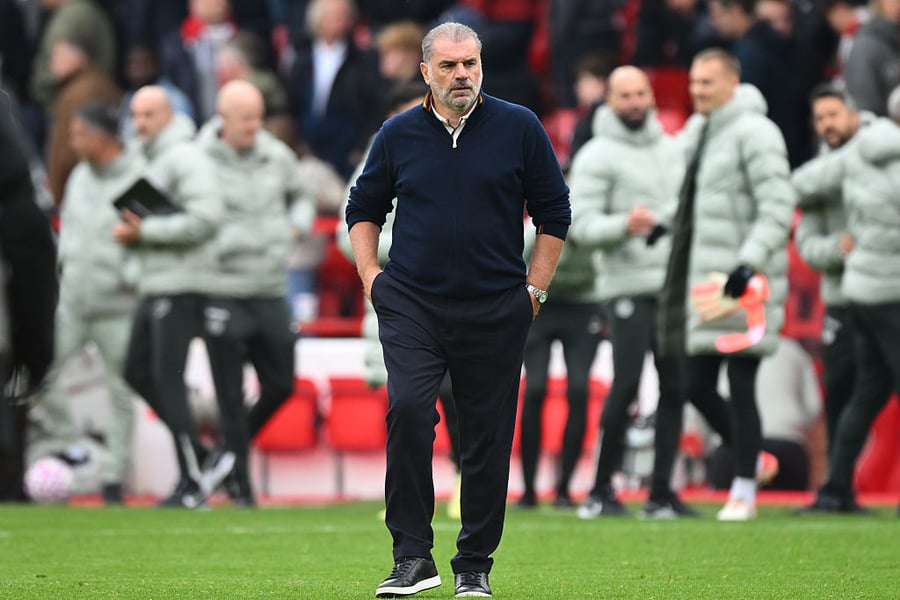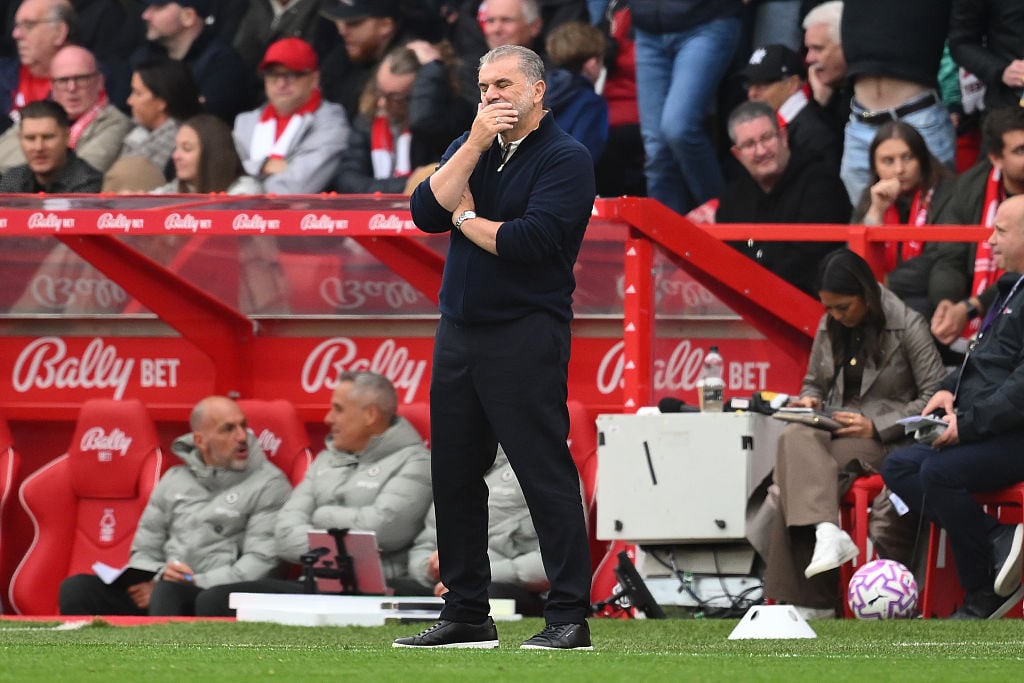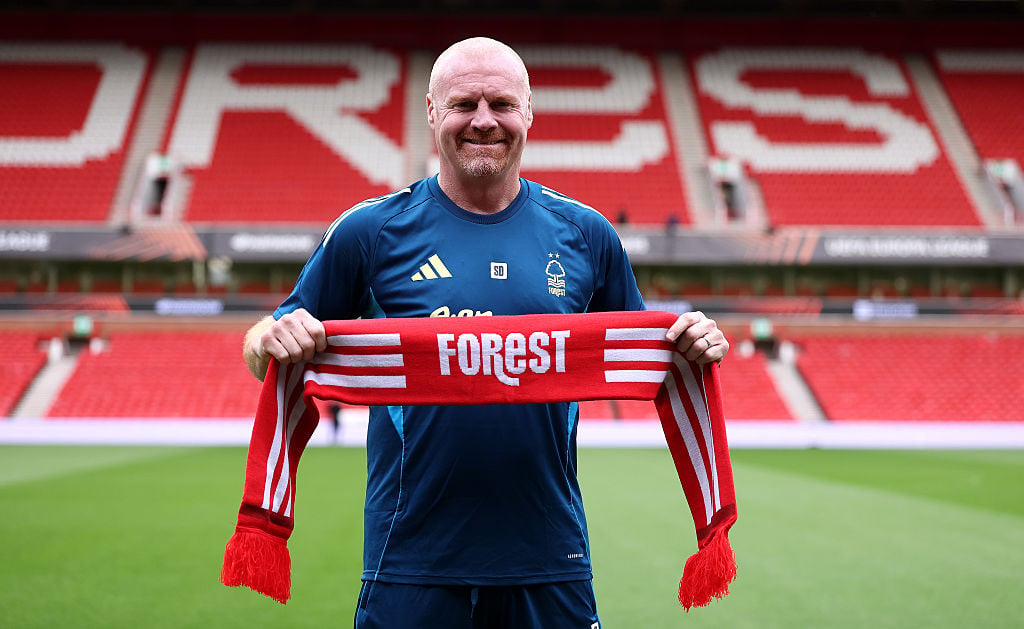“No one wants to grow up and be a Gary Neville.” These famous words, uttered by Neville’s Sky Sports counterpart Jamie Carragher many years ago, came to mind as I watched Sean Dyche’s first press conference as Nottingham Forest manager this week.
A quick refresher: after lasting just 39 days in the job, his predecessor, Ange Postecoglou, was relieved of his duties as Forest’s minutes after a tough 3-0 home loss to Chelsea. In truth, his dismissal had been coming ever since he took on the role.
Because despite what this very writer wrote in a piece published ahead of Postecoglou’s first game in charge all those, um, weeks ago (I had the navel-gazing gall to compare him to Forest’s legendary manager Brian Clough; call it the journalist’s curse), Postecoglou and Forest were never a good fit.
Forest’s caricature owner, Evangelos Marinakis, hired Postecoglou not long after a July event staged by the Greek league to celebrate the latter guiding Tottenham to an unlikely Europa League triumph. Enjoying their Greek connection over a red wine, perhaps, they envisaged a scenario whereby Postecoglou, bruised after his Tottenham ousting, could take Forest to the next level.
Marinakis’ relationship with Postecoglou’s predecessor, Nuno Espirito Santo, after all, was frosty; once Nuno spoke out publicly on the lack of summer window transfer dealings, his fate was sealed.
Postecoglou took over a team who had far exceeded expectations last season, replacing a coach who performed a minor miracle in guiding them to an unexpected seventh place in the English Premier League (EPL).
Even though they missed out on a Champions League spot on the final day, Forest still qualified for European competition for the first time in almost three decades. Nuno found a way to get the best out of unfashionable players like towering New Zealand marksman Chris Wood, scorer of 20 league goals, and the trio of Anthony Elanga, Callum Hudson-Odoi, and Morgan Gibbs-White, underappreciated at bigger clubs but finding form in the Midlands.
Love Music?
Get your daily dose of everything happening in Australian/New Zealand music and globally.
Forest did eventually spend big over the summer, bringing in over 10 players for £180M, but the simple fact remained: the squad did not suit Postecoglou’s style of football. At all.
Forest’s unlikely success last season was built upon a sturdy foundation of defensive-minded, counter-attacking football. They sat deep, biding their time, waiting to pounce, which they eventually did with Hudson-Odoi and Elanga feeding the lanky Wood, who enjoyed his best goalscoring season to date.
But sitting deep and not taking the initiative isn’t Postecoglou’s way; this is the man who deliberately set up his Celtic team to all-out attack Real Madrid — of Modric and Kroos, Benzema and Vinícius Júnior — in a 2022 Champions League game, which led to a 3-0 defeat but plenty of plaudits from those who watched 11 brave, ultimately outmatched players in green and white dare to dream for 90 minutes.
Forest players noticed little differences from Postecoglou’s very first training sessions, with Hudson-Odoi telling talkSPORT afterwards that the Australian had put on an intense initial session.
When it came time for the real thing, however, the players couldn’t fulfil their new coach’s demand to play press-oriented football.
A look at the results makes for grim reading: a 3-0 defeat to Arsenal to kick things off; a humbling 3-2 loss to Swansea in the EFL Cup just days later; a 1-0 home loss to league newcomers Sunderland; no wins in two Europa League games.
Perhaps my previous piece on Postecoglou and Forest, despite the doomed Cloughie comparison, wasn’t so outlandish. “Is he doomed from the start?” I pondered in the headline, and Marinakis and Postecoglou always seemed like an unlikely duo; both stubborn as all hell, both intent on speaking and acting according to their own steely beliefs.
It was always foolish for Marinakis to think that Postecoglou could enact a 360-degree switch in footballing philosophy and style on a group of players still mourning the loss of Nuno.
So, Marinakis tried the defensive-minded counter-attacker, whom he berated on the pitch one awful game; he couldn’t get along with the attacking-minded manager, cut from the same cloth as him. Where to next? The safe option in Sean Dyche, the Gary Neville of football managers.
To even compare Dyche to Neville is to do a disservice to a Champions League-winning player and thoughtful pundit, because Dyche’s level is many rungs below Neville.
A middling lower-league player, most notably with Chesterfield, Dyche entered management at Watford in 2011, steering them to a commendable eleventh place in the Championship. He then joined Burnley, lasting almost a decade at the proud Lancashire club, a spell which included several seasons in the EPL. Dyche’s time at Burnley saw him secure the club their best finish to a top-flight season since the ’70s, as well as Europa League qualification for the first time for over half a century.
After being somewhat unfairly let go by Burnley in 2022, Dyche found his way back into the EPL at Everton in early 2023. To his credit, he guided the Toffees to safety in his first two seasons (Everton were even deducted 10 points in his second season due to breaching FFP rules), but a poor run of results cost him in the 2024/2025 season.
Throughout all these managerial spells, though, even during the relatively success-laden Burnley years, Dyche’s teams have been criticised for their style of play.
A Sean Dyche football team is set up to do one thing: survive. Survive a football game, last a season, don’t get relegated. Win fouls. Tackle a lot. Head anything that comes near your head. Sneak a goal if it takes your fancy.
Entertain, though? Offer fans value for money? Those things don’t matter so much in the Dyche football handbook.
The new Forest manager appeared to take a sly shot at his predecessor in a press conference on Wednesday, drolly noting he has “seen enough fashionistas come in and out of this division.”
“You’ve got to win the games, it’s as simple as that,” he droned. “Long ball, short ball? You’ve just got to play effective football.”
“That will never go out of fashion,” he added.
It must be said at this juncture: Dyche’s “effective football” philosophy will fit right into the current EPL’s general style of play, which has seen a remarkable increase in long throws — once only the terrain of the great Rory Delap — across the entire league.
According to statistics, there have been an average of 3.85 long throws into the opposition box per game this season so far, more than double last season’s average of 1.52.
This dreary development led Jamie Carragher to lament the news on Monday Night Football. “I am frustrated with the fact that I feel like every team this season has taken a long throw at some stage. You see the numbers and it’s off the scale,” the pundit said.
“And I’m trying to think of the reasons why and it’s because some of the top teams are doing it and it almost feels like it’s not something to be embarrassed about it like they maybe would have been in the past.”
Hudson-Odoi, get ready to use your hands, son. It’s easy to see Dyche’s style of football achieving competency and safety for Forest this season, but what do we lose with this survive-at-all-costs attitude?
Underlying the replacement of Dyche for Postecoglou, I think, is a fundamentally existential crisis for football.
The gap between the haves and the have-nots — or the European Super League-adjacent clubs and the rest — is widening by the year. This gap was fully on show during this week’s Champions League games, which featured a 5-1 mauling of Ajax (Ajax!) by Chelsea; a 5-1 trouncing of Eintracht Frankfurt by Liverpool, away from home; Bayern Munich gave an exceedingly tidy Club Brugge team a 4-0 loss; even Arsenal and Atletico Madrid, which once would have been a promising match-up, ended in a 4-0 win for the English side.
When the gulf in quality is that wide, what is left to play for? When the expectation is a defeat by at least a few goals, why bother turning up?
As the big clubs continue to gather and hoard their wealth, leaving the rest to fend for scraps, things are only going to get worse. Marinakis watched his club almost make the top four last season, spent ambitiously in the summer to enhance the squad, and even he’s left panicking about the bottom line.
If even a club who finished seventh in the EPL, the richest league in the world, are already deciding to play it safe after a handful of games this season, you’re left wondering what’s the point of it all.
Yes, Postecoglou could have been given more time — the full season, even — and it could have ended up with the same disastrous result. But Forest fans would have enjoyed an exhilarating ride along the way, and who knows where things might have ended up — just ask fans of a certain North London club, who owe Postecoglou a lifetime of gratitude.
I’m left thinking, as I often do when the modern state of football gets me down, of these immortal words of Jock Stein, Celtic’s greatest-ever manager: “Without fans who pay at the turnstile, football is nothing. Sometimes we are inclined to forget that. The only chance of bringing them into stadiums is if they are entertained by what happens on the football field.”
While Dyche plods along, keeping Forest up by any means necessary, Postecoglou should look outside of England for his next adventure.
The insufferable attitudes of English football journalists, who think they know better than everyone else, has been in direct opposition to Postecoglou’s blunt, supremely Aussie style of communication. To put it as bluntly as the man himself would, the English don’t deserve him. They have forgotten what it’s like to simply enjoy football as a spectacle, too focused on results and money. (Another ludicrous gap: that between the EPL and the Championship, which has reduced most promoted teams to simply returning to the basement league the following season.)
Postecoglou’s football has thrived in Australia and Japan, Scotland and, whether they like it or not, England. But if you’re reading this, Ange, please don’t look too far for your next job: come back to Celtic. It might end up in disaster, but lord knows it will be fun while it lasts.





































